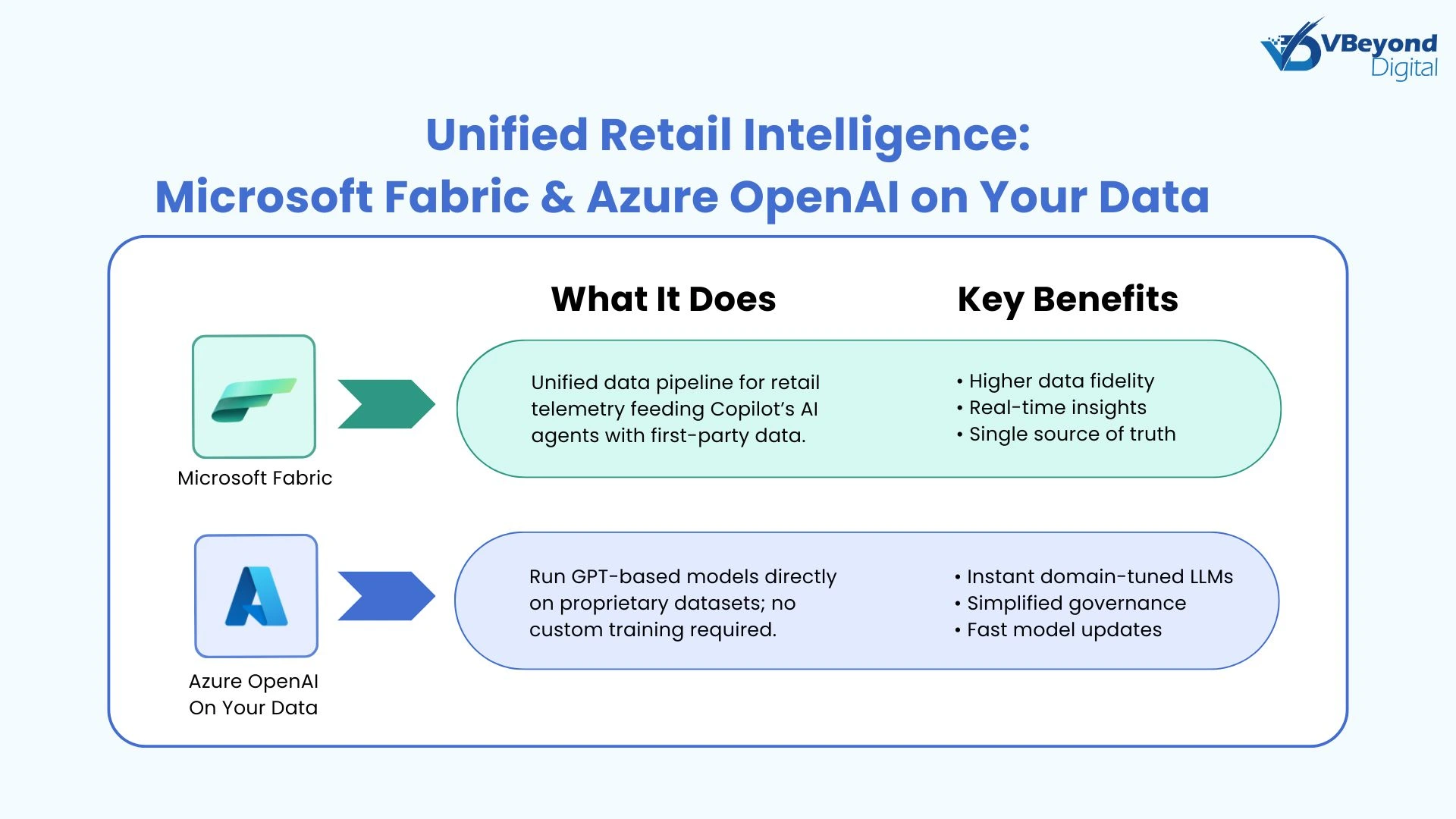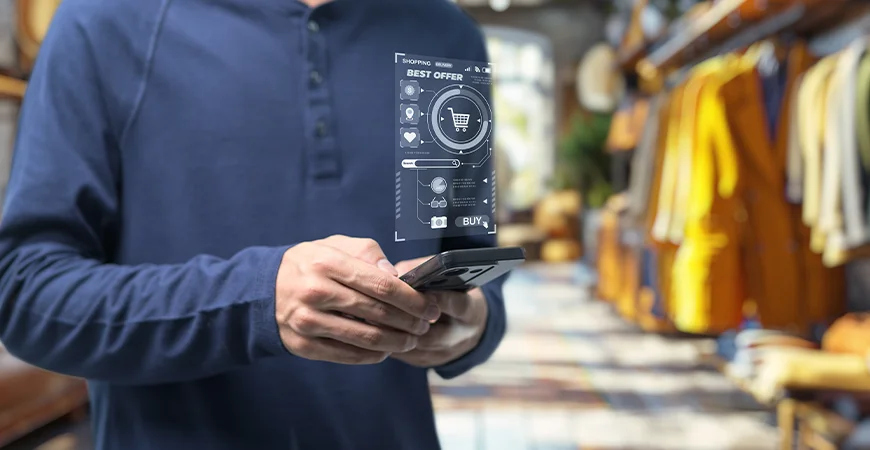Building Smarter, Personalized Retail Experiences with Dynamics 365 Copilot
Section
- AI-Embedded Retail Workflows: Dynamics 365 Copilot injects generative AI agents directly into Commerce interfaces, POS systems, and back-office dashboards—enabling associates and managers to use natural-language queries for customer history, inventory insights, and personalized offers in real time.
- Accelerated Pilot-to-Scale Deployment: Prebuilt Copilot templates in Microsoft Cloud for Retail and role-based AI in Microsoft 365 Copilot for Sales compress development from months to days, embedding scenario packages (e.g., promotions, staffing, customer service) and automating routine tasks across Outlook, Teams, and Dynamics 365.
- Hyper-Personalization at Scale: Retrieval-augmented generation workflows fuse real-time inventory, customer profiles, and behavior to deliver context-aware product recommendations, on-demand loyalty offers at the register, and multilingual support across 23 locales—driving consistent, relevant experiences for every shopper.
- Enterprise-Grade Architecture & Outcomes: A unified telemetry pipeline via Microsoft Fabric, Azure OpenAI “On Your Data,” and the API-first Commerce Scale Unit create a scalable, headless foundation with built-in security and compliance. The structured roadmap from 4–6 weeks pilots to enterprise rollout—yields measurable gains (20–25% conversion lift, 15–20% retention improvement).
Companies that design personalized retail experiences report up to 15% higher conversion rates and up to 25% greater customer lifetime value. These improvements reflect a shift in board priorities: consumers now expect individualized interactions, with 71% demanding personalization and 76% expressing frustration when engagements feel generic.
At the same time, AI-powered customer engagement tools are redefining how retailers interact with shoppers. The result is a truly integrated retail experience. Dynamics 365 Copilot embeds AI-driven insights and natural-language interaction directly within Commerce interfaces and POS systems, enabling front-line teams to access real‑time customer, inventory, and operational intelligence at their fingertips. Retail AI chatbots through Copilot POS integration allow associates to retrieve order histories, membership details, and tailored offers in seconds. By embedding AI in every transaction, retailers reduce decision latency and build consistent next steps for staff, driving trust and efficiency.
Move to intelligent commerce with Dynamics 365 & Copilot
The Dynamics 365 Copilot Advantage
The capabilities showcase AI in retail customer experience that can cut through complexity and deliver immediate, data-driven guidance for every role.
- Dynamics 365 Copilot integrates AI across storefronts, POS, and back-office systems to accelerate personalized retail experiences.
- Microsoft Cloud for Retail’s prebuilt scenario packages compress development from months to days.
- Microsoft 365 Copilot for Sales brings generative AI into seller workflows to reduce manual friction and drive consistent data flows for smart retail experiences.
Embedded AI Agents Across Retail Touchpoints
Dynamics 365 Copilot now integrates AI agents directly within Dynamics 365 Commerce interfaces, enabling associate and manager interactions at multiple touchpoints.
At the point of sale, store associates can invoke a retail AI chatbot through Copilot POS integration to ask natural-language queries, such as viewing a customer’s purchase history or loyalty tier and receive personalized recommendations on screen in under a second.
These retail AI chatbots draw on Azure OpenAI in retail to process natural-language queries and retrieval-augmented generation patterns that underpin recommendations. They suggest targeted offers based on recency, frequency, and monetary data from Customer insights by Copilot.
In back-office dashboards, users can type “ask Copilot” to generate narrative summaries of inventory anomalies, restock recommendations, and sales variance reports directly in the Commerce HQ dashboard, reducing time spent navigating multiple modules and accelerating decision cycles.
Rapid Scenario Deployment with Copilot Templates
Microsoft Cloud for Retail provides prebuilt scenario packages known as Copilot templates that bundle prompts, data models, and UI configurations for key retail processes. These templates cover tasks such as personalized promotions, store task management, and customer service workflows, letting IT teams cut development from months to days by avoiding custom prompt engineering.
For example, the store operations Copilot template analyzes daily sales and staffing data through generative AI to recommend schedule adjustments that balance coverage and labor compliance with demand forecasts. By providing these scenario packages out of the box, Microsoft Cloud for Retail accelerates pilot deployments and reduces integration risk.
Cross-application Insights with Microsoft 365 Copilot for Sales
Microsoft 365 Copilot for Sales embeds a role-based AI agent into Outlook, Teams, and Dynamics 365 Sales, automating routine tasks and surfacing next steps within familiar productivity apps. Copilot for Sales parses email threads, calendar events, and CRM records to draft follow-up messages, set reminders, and log activities without switching contexts, reducing administrative friction by up to 10 seconds per transaction.
In one case study, Investec’s bankers saved approximately 200 hours annually by using Copilot for Sales in Outlook and Teams to maintain data quality and accelerate client interactions. This integration ensures that customer intelligence flows seamlessly from sales into Commerce, enabling sales and store teams to coordinate personalized outreach and fulfillment strategies.
Core Personalization Capabilities
Dynamics 365 Copilot brings AI-powered customer engagement directly into retail workflows, enabling hyper-relevant recommendations, on-the-fly insights at the point of sale, and multilingual support to drive personalized retail experiences at scale.
Context-Aware Product Recommendations
Dynamics 365 Copilot uses Azure AI Search’s retrieval-augmented generation (RAG) patterns to fuse real-time inventory data, customer profiles, and browsing behavior into natural-language product suggestions.
Azure AI Search is the recommended retrieval system for RAG applications, handling both keyword and vector queries to surface the most relevant items.
By incorporating vector indexing and semantic chunking, the system processes product attributes and customer signals in milliseconds, ensuring recommendations remain fresh and contextually accurate.
Azure AI Foundry’s RAG templates provide a proven blueprint for building these recommendation workflows, integrating proprietary catalog and CRM datasets with generative AI outputs.
Key benefits include:
- In-context upsell and cross-sell prompts: Vera Bradley reported that Copilot POS integration helped store associates spark customer conversations and improve add-on sales, driving measurable increases in average order value.
- Governed personalization: Copilot runs on Azure OpenAI Service over retailer-owned data, enabling dynamic personalization without retraining models and preserving compliance with data privacy standards.
Real-Time Customer Insights at the Point of Sale
By embedding Customer Insights profiles into the POS interface, retailers equip associates with a unified view of each shopper’s transaction history, loyalty status, and segment-level behavior.
Through Copilot POS integration, associates can retrieve on-demand restock guidance and loyalty thresholds in natural language, cutting lookup times and manual errors.
In-store promotions become truly dynamic: associates can generate personalized offers on the spot, increasing basket sizes and accelerating throughput during peak periods.
This AI-powered customer engagement frees staff from manual data queries, allowing them to focus on delivering high-touch service and driving consistent operational efficiency.
Global Language and Locale Support
To support global retail operations, Dynamics 365 Commerce Copilot is now available in 23 locales for both storefront and POS interactions, ensuring customers receive personalized experiences in their native languages.
Advanced language fallback and translation services enable Copilot to handle mixed-language inputs gracefully, always responding in the user’s preferred UI language to minimize friction in multilingual environments.
Technical Integration Considerations
Here we look at how Microsoft Fabric provides a unified pipeline for retail telemetry, how Azure OpenAI on Your Data grounds generative responses in proprietary datasets, how the Commerce Scale Unit’s API-first headless architecture supports high-volume smart retail experiences, and the role-based security and compliance controls built into Copilot.

Using Microsoft Fabric and Azure Services
Microsoft Fabric collects data from retail systems orders, inventory levels, and customer events and stores it in OneLake to feed Dynamics 365 Copilot’s AI agents through integrated pipelines such as Azure Data Factory and Power BI Direct Lake queries. This design removes separate ETL processes by allowing real-time queries on telemetry data, reducing latency for analytics-driven recommendations.
Copilot in Fabric then applies generative AI assistance across dashboards and reports, ensuring consistent context for every role.
Azure OpenAI On Your Data enables retailers to run GPT-4 and GPT-3.5-Turbo models directly on their own product catalogs, sales records, and support logs without custom model training via REST APIs or the Azure AI Foundry SDK.
Responses are grounded in the latest enterprise data, and all processing occurs within the retailer’s designated Azure regions to maintain data residency.
Scalable Headless Architecture
Commerce Scale Unit (CSU) Core provides, API-first platform that decouples front-end retail interfaces from business logic, enabling high-throughput processing across cloud, on-premises, or edge environments.
CSU Core runs on ASP .NET Core and .NET 6, offering significant gains in API performance and scalability over legacy frameworks. Its stateless, OData-based APIs support horizontal “brick” scale-out, allowing retailers to handle peak transaction volumes for personalized retail experiences without service degradation.
Security, Compliance, and Governance
Copilot’s AI agents operate entirely within the Azure OpenAI Service framework, which enforces regional availability, responsible for AI content filtering, and Microsoft’s enterprise-grade security controls to meet GDPR and CCPA requirements.
Role-based access controls in Dynamics 365 Commerce restrict Copilot queries and data views to authorized user roles, preventing unauthorized exposure of customer information. Retailers can also select data residency options in Azure, ensuring customer profiles and AI interaction logs remain stored in approved geographic regions.
Implementation Roadmap for Dynamics 365 for Retail
Pilot Phase: Proof-of-Concept in Key Stores
- Define success metrics such as time-to-insight, conversion lift, and average transaction value and track them through Copilot-generated store reports to assess early impact.
- Run a 4-6-week pilot using Microsoft Cloud for Retail’s scenario packages for personalized offers, enabling store teams to test Copilot POS integration in live customer interactions.
- Validate end-to-end integration by confirming Copilot’s access to unified Customer Insights profiles, ERP order feeds, and CRM loyalty data to ensure recommendations draw on fresh, accurate records.
Scale Phase: Enterprise-Wide Rollout
- Incorporate the 2025 release wave 1 Copilot features, including expanded multi-agent orchestration and low-code tuning options, to broaden use cases across supply chain, marketing, and customer service.
- Establish AI governance and change management by following Microsoft’s internal readiness guide for defining roles, access controls, and responsible AI policies to maintain compliance with GDPR and CCPA.
- Implement training programs for 1,000+ store associates and HQ analysts, combining hands-on Copilot workshops with digital learning paths on best practices and license management.
Continuous Improvement via AI Feedback Loops
- Log and monitor Copilot interactions capture user prompts and responses within Power BI or Security Audit logs to identify usage patterns, response quality, and areas for refinement.
- Analyze personalization KPIs such as recommendation acceptance rate and cart-abandonment delta using Fabric’s analytics dashboards to guide enhancement priorities.
- Refine prompts and templates regularly through Microsoft 365 Copilot Tuning in Copilot Studio, leveraging low-code model adjustments to improve context accuracy without full retraining.
Business Outcomes with Dynamics 365 and Copilot Implementation
- Revenue impact: Organizations applying Dynamics 365 Copilot and Azure OpenAI in retail have achieved a 20–25% uplift in sales conversion rates and 15–20% improvements in customer retention, translating to higher average order values and repeat purchases.
- Customer loyalty: Tailored interactions via a retail AI chatbot and Copilot POS integration can drive tangible loyalty gains, with Net Promoter Score improvements often in the mid-teens, helping retailers identify promoters, address detractors, and reduce churn.
Conclusion and Next Steps
Dynamics 365 Copilot delivers AI-powered customer engagement across storefront, POS, and back-office systems to enable truly personalized retail experiences.
From context-aware product recommendations and real-time customer insights at the register to low-code scenario deployments via Microsoft Cloud for Retail and integrated seller workflows in Microsoft 365 Copilot for Sales, retailers can achieve measurable efficiency, revenue, and loyalty gains.
Partner with VBeyond Digital to map these steps onto your retail roadmap, ensuring Dynamics 365 Copilot becomes a strategic enabler of smarter, more personalized customer journeys.
FAQs (Frequently Asked Question)
Dynamics 365 Copilot for retail is an AI assistant built into Commerce, POS, and back-office systems. It answers natural-language queries to surface customer profiles, inventory data, and sales analytics in real time. Associates and managers can get personalized recommendations, restock alerts, and narrative summaries without switching between modules.
Copilot analyzes purchase history, browsing behavior, and loyalty data to generate context-aware product suggestions and promotions. It applies retrieval-augmented generation on Azure OpenAI to merge inventory levels and customer profiles into concise prompts. Store staff see tailored upsell and cross-sell options in under a second at the point of sale.
Yes. Copilot connects to POS, ERP, WMS, and CRM systems via API-first services in the Commerce Scale Unit. It uses standard connectors to pull data into AI scenarios without custom code. IT teams can adjust workflows with Copilot templates for key retail processes like promotions, task management, and restocking.
Microsoft Cloud for Retail offers Copilot templates for personalized promotions, store task handling, and customer service workflows. Each package includes prompts, data models, and UI configurations to cut setup time from months to days. Templates cover schedule adjustments, offer generation, and restock planning—ready for pilot runs without deep prompt design.
Copilot runs on Azure OpenAI Service with data stored in your own Azure regions. AI requests to process only approved first-party data, and role-based access controls restrict queries to authorized users. Interaction logs and customer profiles remain within your environment. For more details, visit our security documentation or contact support.
Begin by defining success measures such as insight speed and conversion lift. Choose a handful of stores for a four- to six-week pilot using Microsoft Cloud for Retail scenario packages. Confirm data feeds from Customer Insights, ERP, and CRM are connected. Contact our consulting team to set up the pilot scope, training, and next steps.



